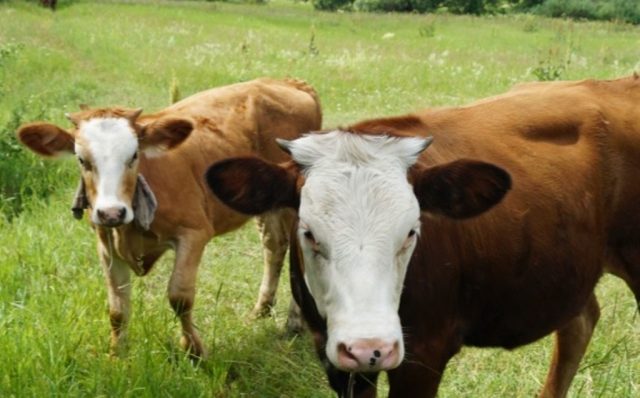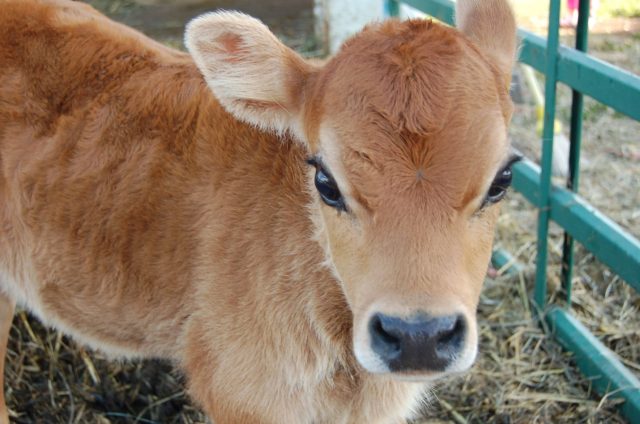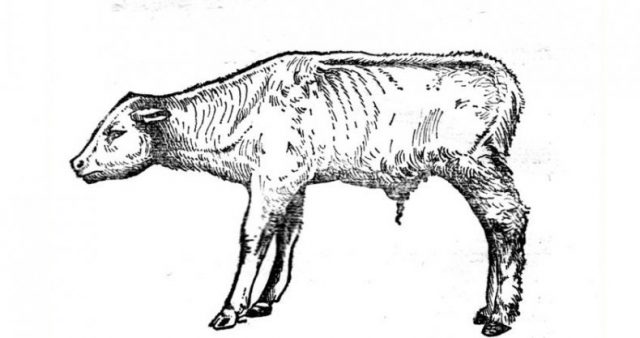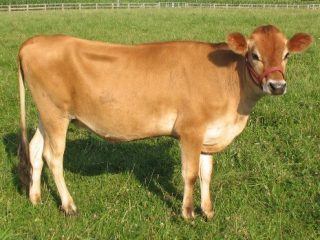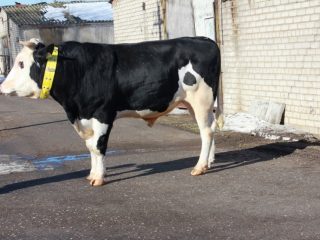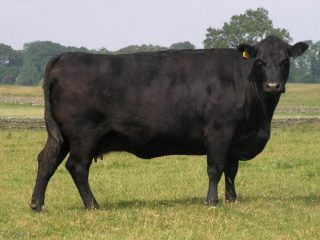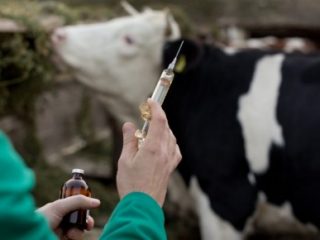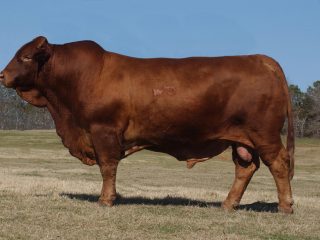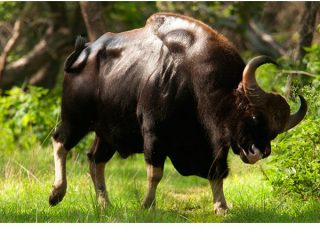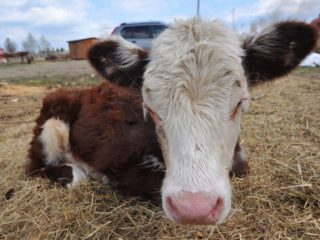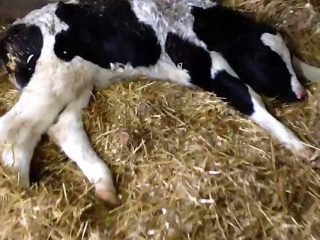Content
Vitamin deficiency in calves and cows often occurs at the end of winter, when the animal has used up all its vitamins and microelements during the winter period. If at the beginning of spring the animal becomes lethargic and refuses to eat, then this is due to a lack of vitamins. A nutritious and balanced diet is an important factor in cattle health.
Vitamin standards for cattle
In order for the calf to grow well, develop and not suffer from vitamin deficiency, healthy supplements must be included in the diet. To provide calves with fortified feed, it is necessary to know the feeding standards.
Standards for dairy heifers:
Age (months) | Carotene (mg) | Vit. D (ME) | Vit. E (mg) |
1 | 30 | 700 | 30 |
2 | 40 | 1100 | 55 |
3 | 60 | 1500 | 85 |
4 | 75 | 1900 | 110 |
7 | 115 | 2500 | 180 |
10 | 135 | 3000 | 230 |
13 | 150 | 3800 | 250 |
19 | 185 | 5300 | 300 |
25 | 235 | 6300 | 330 |
Standards for breeding bulls:
Age (months) | Carotene (mg) | Vit. D (ME) | Vit. E (mg) |
9 | 200 | 3800 | 260 |
13 | 240 | 5000 | 330 |
Causes of vitamin deficiency
Vitamins for calves come first for full growth and development. With sufficient vitamin supplementation, the body of young animals functions normally. If there is a deficiency, a malfunction occurs in the body, which leads to a decrease in milk yield. As a result, the farmer has no profit, and the cow suffers from vitamin deficiency.
Vitamins play an important role for the proper development of young animals and prevent the occurrence of vitamin deficiency:
- support health, as each vitamin plays a specific role;
- with the correct selection of vitamin supplements, pregnant cows tolerate childbirth better, and lactation proceeds normally;Important! When feeding a calf, the cow gives away most of the nutrients along with the milk, so 2 weeks before calving, an adult animal is given a double vitamin dose.
- during the dry period, they provide the basis for the full development of the fetus, and also prepare the cow for the upcoming lactation;
- Thanks to fortified feeding, beef bulls quickly increase their body weight.
Symptoms of vitamin deficiency
With an unbalanced diet without the addition of nutrients and microelements, the body of young animals suffers first. Vitamin deficiency often occurs in winter and early spring. This is due to the reduction in sunny days and the lack of green vegetation. In regions with harsh winters, animals spend little time outdoors, which affects their health.
With vitamin deficiency, the animal experiences:
- Decreased appetite. This is due to the fact that the lack of nutrients responsible for the functioning of the digestive system provokes a partial refusal of food, which leads to a sharp decrease in body weight.
- Low milk yield of cows. Lack of healthy nutrition affects the quantity and quality of milk. If you approach feeding irresponsibly, the cow can not only reduce her milk yield, but even stop it completely.
- Reproductive passivity. With vitamin deficiency, breeding bulls lose the desire to mate. Cows in this state are less likely to be inseminated, and during gestation, miscarriages often occur or dead calves are born.
- Calves should not be allowed to suffer from vitamin deficiency, as they will stop growing and developing.
- Meat breeds dramatically lose body weight.
- Vitamin deficiency opens the door to chronic and infectious diseases.
- If an animal has a cataract, vitamin deficiency can lead to blindness.
What vitamins are most often deficient?
Most often, cows suffer from a lack of vitamins: A, B, D and E.
The source of retinol is green grass. It contains carotene, which is responsible for the production of cells throughout the body.
Due to a lack of carotene, milk yield decreases, vision deteriorates, and damaged skin is poorly regenerated.
Carotene deficiency in cows can be recognized by the following symptoms:
- frequent inflammation of the eyes and mucous membranes;
- sudden loss of vision - animals bump into various objects, bow their heads closer to the ground;
- decrease in milk yield;
- inflammation of the digestive and respiratory systems;
- violation of movement coordination;
- reproductive function is suppressed.
Group B vitamins renew blood cells, strengthen the nervous system, and are responsible for brain activity. Particular attention is paid to vitamin B12, as it is a good preventative measure for many infectious diseases and protects against anemia.
With its deficiency, cows experience:
- lack of appetite, which leads to thinness and slow growth of calves;
- excited state, nervousness;
- skin diseases such as eczema, dermatitis;
- joint inflammation;
- cavalry gait. The cow raises her legs high and bends her legs strongly;
- miscarriage in early pregnancy and premature stillbirth of calves.
Vitamin D is responsible for the growth and development of the body. If there is not enough of it, the calf stops growing, and the supply of calcium also stops, which leads to rickets, brittle bones and teeth.
If there is a lack of calciferol in a calf, the following are observed:
- periodontal disease, tooth loss;
- rickets;
- lameness;
- pain on palpation in the area of the ribs, joints, pelvic bones;
- eating bones and stones, as well as licking various objects;
- refusal to eat;
- malfunction of the digestive system.
Cows enrich their bodies with calciferol by consuming green grass and spending long periods of time outdoors.
Vitamin E is responsible for the functioning of all internal organs, participates in metabolism and is responsible for the reproductive system. Lack of tocopherol affects the development of the fetus and is responsible for the health of the young.
With a lack of tocopherol, cows develop the following symptoms:
- a cow does not become pregnant for a long time;
- regular miscarriages;
- stillborn fetuses;
- diseases of the cardiovascular system;
- sperm activity decreases in breeding bulls;
- the growth and development of calves stops;
- Beef breeds build muscle mass slowly.
With an acute lack of tocopherol, paralysis of the limbs can occur.
Treatment of vitamin deficiency in cows
If vitamin deficiency is detected in cows based on symptoms, treatment must be started immediately. To do this, you need to properly balance your diet and start providing assistance.
If there is a lack of carotene in the feed, add:
- "Biovit-80" – improves the digestive system and strengthens muscle tone;
- "Eleovit" – increases immunity, the drug is recommended to be added to the feed of calves at birth;
- Vilofoss – the drug saturates the body of cows with proteins and vitamins.
Also included in the diet are carrots, fish oil, alfalfa hay, oatmeal and oatmeal jelly. Kissel is prepared in the evening.To do this, flakes or whole grains are poured with boiling water and covered with a warm blanket. The drink will infuse overnight and can be given to the calf. For young animals at the age of 1 month, the daily dose should be 2.5 kg of jelly, and the norm of root vegetables should be 2 kg.
If it is not possible to introduce carotene into the diet, you can supplement it with medication. For an adult pregnant cow, the daily oral intake should be 100 thousand IU, and for young calves the dose is 1 million IU at the first feeding. Cows can also be given an intramuscular injection of 100,000 IU every 2 weeks.
At the first signs of vitamin B deficiency, it is necessary to begin treatment immediately, without waiting for complications. Treatment consists of adding carrots, brewer's yeast and bran to the feed.
In advanced forms of vitamin deficiency, intramuscular injections of vitamin B12 are prescribed. To do this, use a 0.1% solution in a volume of 100 ml.
If a farmer detects symptoms of an animal suffering from a lack of calciferol, then first of all it is separated from the general herd. The calf is transferred to a certain diet, often taken out to pasture on sunny days, since the best helpers against vitamin deficiency are bright sun and green grass.
In advanced stages of vitamin deficiency, drug therapy should be used. Before treatment begins, the cow's blood is taken for electrolyte levels.
Drug treatment of vitamin deficiency is carried out in several ways:
- ultraviolet radiation – 10-15 minutes daily;
- intramuscular injections of vitamin D at a dosage of 200 IU;
- for progressive disease, a 20% solution of calcium gluconate is prescribed;
- intravenous injection of 10% calcium chloride.
To replenish the supply of tocopherol, use the Trivitamin oil solution. The dosage is prescribed only by a veterinarian after a complete examination.
Prevention measures
To prevent the occurrence of vitamin deficiency, you must follow simple rules:
- Prepare fresh vegetables for the winter: carrots, potatoes, beets.
- Keep the stall clean, warm and well lit.
- Always add B vitamins to the feed; they are found in bran, vegetables, green hay, feed and baker's yeast.
- In the spring and summer, prepare silage - corn, clover. Bone meal and chalk are added to the food. If it is not possible to keep the grass fresh, it is dried and fed to livestock in the form of hay.
- Sprouted wheat grains are added to the diet.
- On a frosty sunny day, cows are often taken out for a walk.
Conclusion
Vitamin deficiency in calves is a dangerous disease, since with a lack of vitamins, young animals lag behind in growth and development, cows’ milk yield decreases, and meat breeds do not gain body weight. If you follow the rules of care, introduce fortified supplements into your diet and take regular walks, you can not be afraid of developing a terrible disease.
